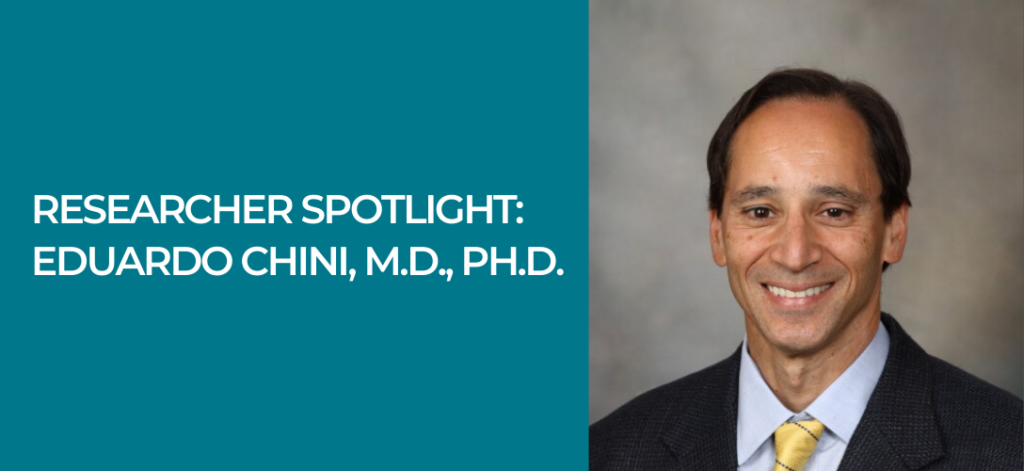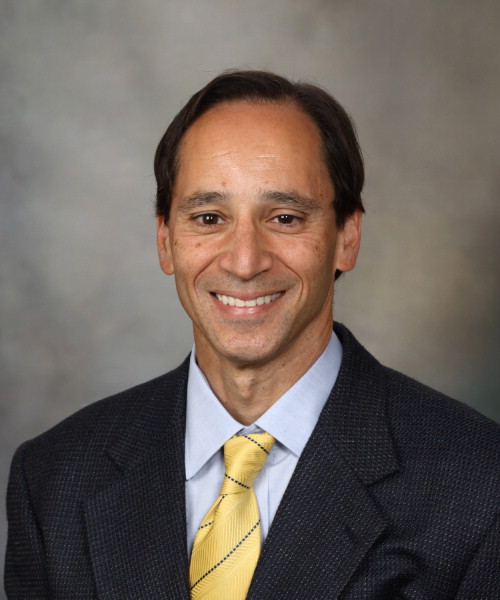
Published on July 27, 2021
Eduardo Chini, M.D., Ph.D., Mayo Clinic
How did you first get involved in PKD research?
Eduardo: I’ve trained with Dr. Thomas Dousa one of the found fathers of biochemical nephrology. He studied signal transduction in kidney disease for many years. During my first years as an independent investigator, my focus was metabolism and aging. I noticed that many of the same pathways involved in the disruption of metabolism and the aging process were also implicated in the pathogenesis of PKD. Thus, we started to investigate the role of metabolism and nutrition in PKD in an era where the role of these components had not clearly been implicated as a part of the pathogenesis of this disease.
 What are you working on currently?
What are you working on currently?
Eduardo: Our laboratory was the first one to study the role of nutritional interventions such as caloric restriction (CR) in PKD. We published a seminal paper in 2016 demonstrating that restricting caloric intake in animal models of PKD had a major effect on the development of the disease. We further explored the mechanism by which CR prevented PKD in mice and found that this was at least, in part, mediated by the insulin-like growth factor (IGF) pathway.
Currently, we’re investigating the specific role of single amino acid restriction in models of PKD. In particular, we’ve recently published that the restriction of the single amino acid methionine could ameliorate PKD in mice. We further evaluated its mechanism and we’re currently studying specific pathways that are activated by methionine restriction that could have a role in PKD development.
What would you like the patient community to know about your research?
Eduardo: We have a commitment to study molecular nutritional aspects in PKD to both understand its pathogenesis but also to develop new treatment modalities for this disease. We believe that nutritional components and nutritional manipulations may have an important impact on the progression of the disease. At the same time, I’d like to stress that the translation of our animal findings needs validation in human trials. This would take time and significant effort from patients, funding agencies, and researchers.
Do you have any personal connections to PKD?
Eduardo: I had three family members who had PKD and aneurismal ruptures secondary to the disease.
What excites you most about this research?
Eduardo: The field has been changing since our first discovery of the role of caloric restriction in PKD, and now molecular nutritional interventions appear to have a very important part in the field. I’m very excited about the animal models that have been developed and about the growing, clear implication of the role of nutritional interventions in PKD. We continue to be excited not only about the basic scientific findings but also about the potential translation of these findings
What are some of your personal interests outside of research?
Eduardo: I’m a clinician (anesthesiologist) in addition to be an investigator. In particular, my main clinical interest is in transplant anesthesiology, and I’ve been involved in liver, pancreas, and kidney transplant practice. Most importantly, I have many interests outside of work. I play sports (in particular soccer), I love hiking (I’ve hiked Kilimanjaro in Africa), cooking, playing the guitar, and I love spending time with my family and our dog. I think that it’s very important to have a productive and fun life outside of work.
Anything else you’d like to share?
Eduardo: The PKD work in our laboratory couldn’t be done without great teamwork and partnership with the Mayo Clinic PKD Center and with our collaborators in and outside of Mayo. Dr. Sonu Kashyap leads the PKD studies in our laboratory and is a young investigator interested in kidney disease and PKD.

“In 2018, I joined Dr. Chini’s research team which had been working on ADPKD with an emphasis on metabolism and nutritional interventions. Importantly, we’ve demonstrated the role of the IGF pathway in PKD pathogenesis. In addition, recently we showed that dietary restriction of methionine ameliorates the cystic disease in PKD mice.
Currently, I’m leading the PKD-related studies in the laboratory involving nutritional interventions, the role of senescence, the translational implication of FGF21 and drug repurposing that may target IGF pathway in ADPKD.”
—Sonu Kashyap, Ph.D., Research Associate
Want to learn more about Dr. Eduardo Chini’s project and others funded by the PKDF? Find them here! And read more recent researcher spotlights.
The PKD Foundation is the largest private funder of PKD research in the U.S. Since 1982, we’ve invested over $50 million in more than 1,300 research, clinical and scientific grants, fellowships, and scientific meetings. Each year, the Foundation identifies and supports the work of scientists and researchers from around the world who look for ways to treat and eventually cure PKD. Our vision is to #endPKD. Donations fund necessary research that leads to more effective treatments and ultimately a cure for PKD.









Sure wish there was a way to bust cysts and them never return.
I live in Wisconsin and currdoctor at Mayo in Eau Claire. I am in stage 3 CKD and have ASDPKD. Do you have any current trials or studies available?
When you begin human trials on
how less calories affects people
Will the PKD foundation be asking for participants. Is this true for liver and kidney cysts?
Very interesting research done in a different way than I have heard about through the PKD Foundation. I do hope you can start human trials eventually. My brother and I both have ADPKD and have luckily received transplants, but we both spent 3-4 years on dialysis. Research has come a long way since I was first diagnosed in 2001 and I am happy to see researchers still trying to make a difference for PKD patients in the early stages. Good luck to you!